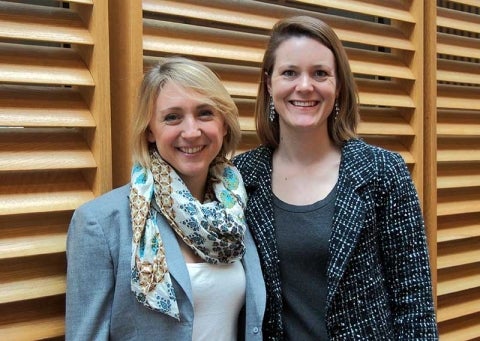Note: Yale School of the Environment (YSE) was formerly known as the Yale School of Forestry & Environmental Studies (F&ES). News articles and events posted prior to July 1, 2020 refer to the School's name at that time.
Globally, the costs of natural disasters are increasing — a phenomenon that is compounded by the effects of climate change, population growth, and institutional instability.
 Katy Mixter ’17 M.E.M./M.B.A., left, and Laura Hammett ’17 M.E.M.
Katy Mixter ’17 M.E.M./M.B.A., left, and Laura Hammett ’17 M.E.M.
During their time at Yale, F&ES students Laura Hammett ’17 M.E.M. and Katy Mixter ’17 M.E.M./M.B.A. have focused their research and course work on methods of climate adaptation and disaster risk-reduction planning. And while they’ve observed hopeful examples of innovation, they found that most of these encouraging strategies are confined to specific sectors, such as infrastructure or energy development.
As part of their F&ES masters project, Hammett and Mixter recently convened experts from humanitarian and financial organizations for a one-day workshop on the challenges of post-disaster reconstruction and resilience. The discussion was built around a guiding question: What types of adaptive financial products can be develop to direct private capital to vulnerable small businesses after disasters?
“We wanted to see whether there is a way to facilitate the development of financial products to much needed investments addressing complex social issues,” Hammett said. “We thought that, given the complexity of many social challenges, design-thinking processes may offer a way to host a workshop that would create cross-sector learning, increasing participants’ understanding of these challenges and reducing barriers to developing new financial solutions.”
Participants included representatives from Citigroup, the Connecticut Green Bank, the World Bank, the Red Cross Red Crescent Climate Centre, 100 Resilient Cities, and other organizations.
During a full day of discussions and brainstorming, the participants identified the main challenges — including the need to pair financing with successful operations systems, an information “asymmetry” that makes it difficult for financiers to understand the risks faced by small businesses, and a lack of trust between both sides.
Proposed solutions included the anticipatory creation of a clearinghouse to close credit information gaps and and to reconnect supply chains after disasters. They also proposed new strategies for post-disaster resource sharing, including alternative currencies and formalized post-disaster barter systems. Solutions were focused around the idea of adaptive financing, or financial mechanisms that will allow for flexible post-disaster response that is context appropriate.
Hammet and Mixter called the session a “catalyst for cross-sector innovation.”
“We are also actively exploring additional opportunities to lead similar workshops and continue to refine the innovation process to incite innovation in this field,” Mixter said.
The workshop marked the culmination of their master’s project, which they conducted with Brad Gentry, a Professor in the Practice at F&ES and Associate Dean for Professional Practice. It was sponsored in part by the Yale Center for Business and the Environment and the Class of 1980 Fund.
As part of their F&ES masters project, Hammett and Mixter recently convened experts from humanitarian and financial organizations for a one-day workshop on the challenges of post-disaster reconstruction and resilience. The discussion was built around a guiding question: What types of adaptive financial products can be develop to direct private capital to vulnerable small businesses after disasters?
“We wanted to see whether there is a way to facilitate the development of financial products to much needed investments addressing complex social issues,” Hammett said. “We thought that, given the complexity of many social challenges, design-thinking processes may offer a way to host a workshop that would create cross-sector learning, increasing participants’ understanding of these challenges and reducing barriers to developing new financial solutions.”
Participants included representatives from Citigroup, the Connecticut Green Bank, the World Bank, the Red Cross Red Crescent Climate Centre, 100 Resilient Cities, and other organizations.
During a full day of discussions and brainstorming, the participants identified the main challenges — including the need to pair financing with successful operations systems, an information “asymmetry” that makes it difficult for financiers to understand the risks faced by small businesses, and a lack of trust between both sides.
Proposed solutions included the anticipatory creation of a clearinghouse to close credit information gaps and and to reconnect supply chains after disasters. They also proposed new strategies for post-disaster resource sharing, including alternative currencies and formalized post-disaster barter systems. Solutions were focused around the idea of adaptive financing, or financial mechanisms that will allow for flexible post-disaster response that is context appropriate.
Hammet and Mixter called the session a “catalyst for cross-sector innovation.”
“We are also actively exploring additional opportunities to lead similar workshops and continue to refine the innovation process to incite innovation in this field,” Mixter said.
The workshop marked the culmination of their master’s project, which they conducted with Brad Gentry, a Professor in the Practice at F&ES and Associate Dean for Professional Practice. It was sponsored in part by the Yale Center for Business and the Environment and the Class of 1980 Fund.
Published
March 23, 2017